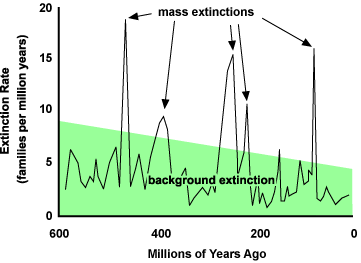As an environmental geologist, my education included classes in Historical Geology and Paleontology. We studied many examples of mass extinctions over the past billion years and species that could and could not adapt to changing conditions. A famous example is dinosaur extinction and what species survived after. There were several theories we examined for why the dinosaurs died including thinning dinosaur egg shells, volcanic activity or asteroid impacts. The father-son team of Luis and Walter Alvarez proposed in 1980 that an asteroid hit the earth about 66 million years ago causing dinosaur extinction. Great debate occurred of over many years - in 1989, I heard Dr. Walter Alvarez speak at the University of New Mexico as to how they developed 10 independent lines of evidence to prove their hypothesis and develop a new theory. Still some people were not convinced but in 2010 a review confirmed the evidence.
So guess what survived the asteroid-impact? Flying dinosaurs evolved into many bird species as well as small mammals and ferns thrived. They escaped catastrophe and adapted very quickly as the sudden asteroid impact caused global climate change, earthquakes, tsunamis, fires, and mass chaos. The smallest species survived through quick adaptation while the huge dinosaurs could not.
Here is some interesting reading from University of California at Berkeley on resolving misconceptions about evolution and how species survive.
Can humans respond to the threats of climate change and other environmental issues and how will life continue to evolve?
According to PBS, Max Planck from Germany received the Nobel Prize in 1919 for explaining radiation from hot materials. In 1901, he devised a theory that perfectly described the experimental evidence, but part of it was a radical new idea: energy did not flow in a steady continuum, but was delivered in discrete packets which he later called quanta. Planck stated: "A new scientific truth does not triumph by convincing its opponents and making them see the light, but rather because its opponents eventually die, and a new generation grows up that is familiar with it."
So we know life on Earth and humanity are in crisis. The number of climate deniers and people avoiding environmental issues is slowing reducing. Hopefully, our societies can make rapid progress and the activism by the younger generation is very refreshing. See the news on worldwide climate strikes! I just hope that we can live long enough to see positive changes for sustainability before things get any worse!
Please post a comment if you want to share ideas on this or other blog posts.

